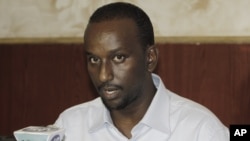Somalia's president renewed an offer of amnesty Wednesday to members of the al-Qaida-linked militant group al-Shabab.
President Hassan Sheikh Mohamud said that his government will ensure the safety of any al-Shabab members who acknowledge their crimes, reject the militant group, and embrace Somalia's peace-and-reconciliation process.
In the comments, released by his spokesman, Mohamud also said his government will help defectors learn a trade or find a job.
The comments follow the defection of al-Shabab's former intelligence chief, Zakraiya Ismail Hersi, and what the government said is a steady flow of "foot soldiers" abandoning the militants.
Mohamud said some crimes, such as murder and rape, are not subject to amnesty, but added those who committed such crimes could join the peace process after serving their sentences.
Former leader denounces al-Shabab
On Tuesday, Hersi denounced the militant group during his first public appearance after surrendering to the federal Somali government last month.
Hersi said the group's leaders had misled militants into fighting a distorted form of jihad, and he vowed to convince fighters to renounce violence and to surrender to the Somali government.
Authorities in Somalia have welcomed the Hersi’s defection, which was announced December 27.
Until his defection, Hersi, also known as Zaki, served as the head of intelligence for the Somali-based militant group, which was designated a terrorist group by the U.S. in 2008.
In 2012, the U.S. placed Hersi, and six other top al-Shabab leaders, on its most wanted global terrorist list. The U.S. offered a $3 million reward for Hersi's capture.
At a news conference in Mogadishu Tuesday, Hersi denounced his former group and called on the other fighters to abandon the terrorist organization and join the Somali peace process.
"I can confirm that as of today I am no longer a member of al-Shabab and I have renounced violence as a means of resolving conflict and I will aim to achieve my goals towards peaceful means and I also call on and encourage all my friends to seek out a peaceful way of resolving all conflicts and towards reconciliation," Hersi said.
He is the most senior al-Shabab commander to surrender to the Mogadishu-based government since Hassan Dahir Aweys surrendered in June 2013, and Said Atam, the head of al-Shabab in the Puntland region, surrendered in June 2014.
Successes against militant group
Al-Shabab once controlled much of southern and central Somalia and imposed a harsh form of Islamic law that banned music and led to public amputations for accused thieves.
Government and African Union troops have recaptured most of the territory, but the militants were still able to kill several members of parliament last year, and launch two major assaults on the presidential palace.
The Somali government first offered amnesty to al-Shabab fighters last September, after al-Shabab's top leader Ahmed Abdi Godane was killed in a U.S. airstrike.
Since Godane's death, al-Shabab's leaders have been divided, but it has remained a strong fighting force and challenge to the Somali government.
In words directed at the militants on Wednesday, the president said he knows many al-Shabab members joined for "reasons that made sense at the time," including the need for money, or a sense they were proving themselves to be good Muslims or good Somalis.
But, he added, "What you did does not have to dictate the rest of your life."
Mohamud acknowledged some Somalis are uneasy about amnesty for al-Shabab members. He said those who defect go through a process of "supervised rehabilitation" and are monitored by Somali security forces to ensure they continue to reject the militant group.
He asked Somalis to "accept the need for concession and to exercise forgiveness" in order to close "a dark chapter in Somalia's history."





